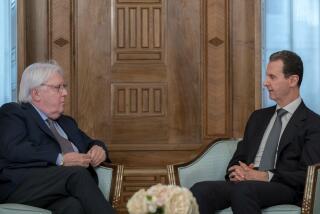Syriaâs Bashar Assad says a peace pact would face a referendum
BEIRUT â Any agreement reached at prospective peace talks on Syria would have to be approved by the Syrian people in a nationwide referendum, President Bashar Assad said in a television interview aired Thursday.
A confident Assad said his government would participate in the peace conference, sponsored by the United States and Russia, and would negotiate directly with the opposition absent any preconditions, but he insisted that any agreement would have to be put to the ballot.
âEither side can propose anything, but nothing can be implemented without the approval of the Syrian people,â Assad said, according to the official Syrian transcript of the interview with Lebanonâs Al Manar TV.
An agreement reached last year in Geneva, which forms the basis of the projected new talks, called for negotiations leading to the formation of a transitional government accepted by both sides in the conflict. But Assad said such an administration, which would sideline the president, also would have to pass in a popular referendum.
âThe president cannot just relinquish his authorities; he doesnât have the constitutional right,â Assad said in the interview with Al Manar, the media voice of Hezbollah, the pro-Assad Lebanese political and militant group.
Left unanswered was how a referendum could be held in war-ravaged Syria, where large parts of the country remain contested or under rebel control.
The presidentâs comments were aired as prospects seemed to dim that the Moscow- and Washington-brokered conference would even take place.
After a week of meetings in Istanbul, Turkey, the most high-profile opposition group, the U.S.-backed Syrian National Coalition, declared that it would boycott the conference until pro-Assad Iranian and Hezbollah forces end their âinvasionâ and leave Syria.
âIn light of this savagery, any talk of an international conference or a political solution in Syria is meaningless,â the oppositionâs acting head, George Sabra, told reporters in Istanbul.
Iran backs Assad but denies having any forces in Syria. Hezbollah has acknowledged that its militiamen are fighting alongside Syrian units in a battle for the strategic city of Qusair, near the border with Lebanon.
The opposition coalitionâs decision to not attend the planned negotiating session would seem to undercut the conference, which Washington and Moscow have portrayed as a make-or-break effort to end more than two years of violence in Syria. The rebuff was also an embarrassment to the Obama administration.
Although Russia has been able to secure Assadâs presence at the so-called Geneva 2 session, the White House has failed in bringing to the table the fractious coalition that Washington has labeled the âlegitimate representativeâ of the Syrian people.
In Washington, officials suggested the oppositionâs stance was reversible.
âWe encourage publicly the opposition not to derail from its stated commitment of working toward a political solution,â State Department spokeswoman Jen Psaki told reporters.
Assad, in the interview, took a swipe at the U.S.-backed exiled opposition and their penchant for meeting in five-star hotels in fashionable capitals, far from the tumult in Syria. He called the exiled opposition âslavesâ to their foreign patrons, including the United States, Turkey, Saudi Arabia and Qatar.
âWe are attending the conference not to negotiate with them, but rather with the states that back them,â Assad said. âIt will appear as though we are negotiating with the slaves, but essentially we are negotiating with their masters. This is the truth. We shouldnât deceive ourselves.â
On other topics, Assad declined to answer directly when asked whether Russia had already provided Syria with the advanced S-300 air defense system as promised, or whether the missiles were on their way. Israel and its allies have sounded alarms at the prospects of such deliveries, which would be a threat to Israeli air supremacy.
âIt is not our policy to talk publicly about military issues in terms of what we possess or what we receive,â Assad told the Lebanese broadcaster.
The comments contradicted earlier reports quoting Assad as saying that Syria had received its first batch of the missiles, and that the rest would arrive soon. The reports, based on a supposedly leaked version of the interview, made international headlines.
Russia said this week it planned to proceed with deliveries of the S-300 system to Syria, but Moscow did not specify when the weapons would be shipped or whether they had been transferred.
The Russian Foreign Ministry said the missiles would act as a deterrent to âhotheadsâ determined to intervene in the Syrian conflict.
Moscow acted after the European Union failed to renew its arms embargo on Syria. France and Britain are considering providing weapons to the Syrian rebels, but not before Aug. 1.
Israel had asked Russia to cancel the S-300 missile shipments. On Tuesday, Israelâs defense minister, Moshe Yaalon, said it would âknow how to actâ if officials detected that the weapons had been shipped to Syria.
The various reports of new weaponry headed to Syria â both to the government and to the rebels â have complicated U.S.-Russian efforts to sponsor the peace conference in Geneva.
Assad was muted about Syriaâs prospective response to any future airstrike by Israel, which has been linked to three air assaults on Syrian weapons facilities this year.
âWe will respond the next time,â the president vowed, but provided no details.
Assad also said he would ânot hesitateâ to run for a third term as president in elections scheduled for next year if he sensed a âpublic desireâ for his candidacy.
âHowever,â Assad said, âif I feel that the Syrian people do not want me to lead them, then naturally I will not put myself forward.â
Special correspondent Nabih Bulos in Amman, Jordan, contributed to this report.
More to Read
Sign up for Essential California
The most important California stories and recommendations in your inbox every morning.
You may occasionally receive promotional content from the Los Angeles Times.










